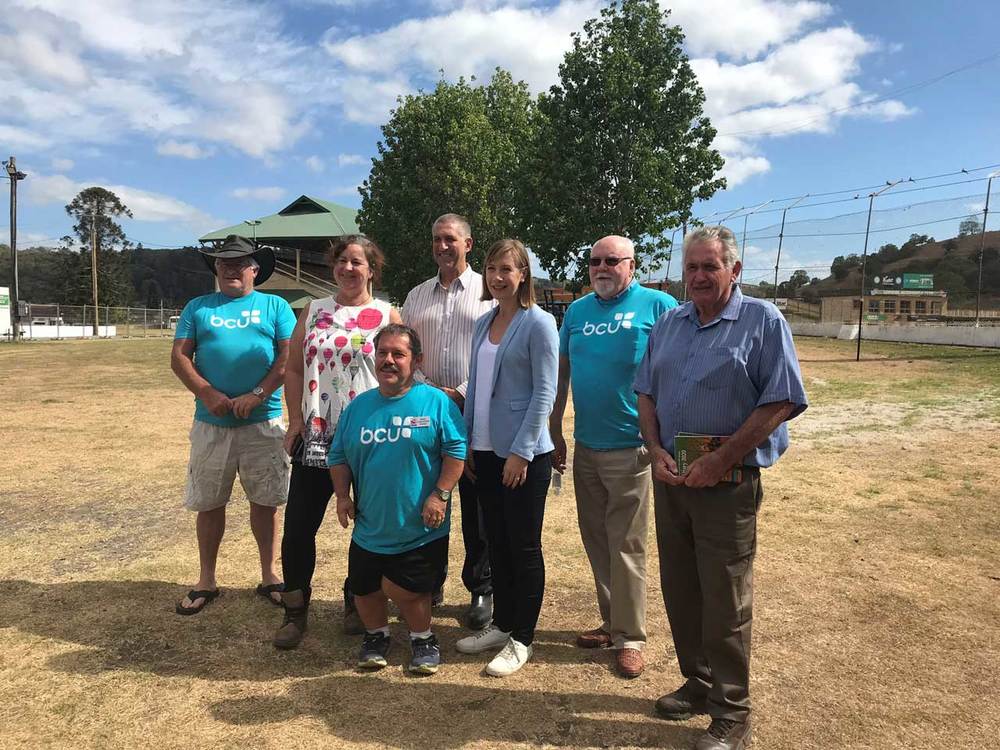Bushfire emergency volunteers recognised
Liina Flynn
25 November 2019, 4:49 AM
 MP Jo Haylen meets Salvation Army member Philip Sutcliffe and volunteers Kathy Preston and Kellie Phillips at the Salvation Army Headquarter in Goonellabah.
MP Jo Haylen meets Salvation Army member Philip Sutcliffe and volunteers Kathy Preston and Kellie Phillips at the Salvation Army Headquarter in Goonellabah.At the peak of the recent bushfire emergency in the local area, Salvation Army volunteers were feeding about 180 displaced people from Nimbin communities every day.
These volunteers, who were instrumental in helping out evacuees from the recent Mount Nardi bushfires near Nimbin, today met with Shadow Minister for Seniors and Volunteers, Jo Haylen.
Ms Haylen visited The Salvation Army headquarters and the Lismore Showground, where she heard about the work done by dedicated locals who gave their time to help others in the community.
Salvation Army Lieutenant Reverend Philip Sutcliffe said about 20 Salvos volunteers coordinated assistance and made meals for the people staying at the Nimbin Showgrounds evacuation centre.
“We had limited facilities when the bushfires were on, so we did a lot of the food preparation in our kitchen at our Goonellabah premises, then took it out to the Nimbin showground,” he said.
“We needed an indoor work space to protect our volunteers from the thick smoke that they would be exposed to in the evacuation site.”
“We work year round and are always on call in emergencies – from floods to fires.
“We prepare about 1800 meals a year with food donated from our major sponsor Woolworths and the recent bushfire emergency also saw local business supplying boxes of fresh produce.
“We’re always looking for more people to put up their hand to help out and volunteer.
“This time of year, we are usually preparing for floods, but there’s no rain and we’re instead preparing for the different challenges of fire preparations."

MP Jo Haylen meets volunteers at Lismore Showgrounds.
Volunteers
Salvos kitchen volunteers Norma Elsley and Kathy Preston spent hours in the kitchen preparing salads and food for evacuees at Nimbin Showgrounds.
Norma’s parents were ministers and she said she has been a volunteer all her life.
Every week she helps out at the Salvos - whether it’s in emergencies or preparing Christmas hampers or whatever is needed.
“Volunteering is rewarding - you feel you are doing something for someone else,” Norma said.
“Sometimes all people need is someone to listen to their problems, not fix them.
“Talking to them about their problems is the best thing.”
Sandra is one of the coordinators at the salvation Army in Lismore.
She works six days a week with a limited pool of volunteers – doing everything from coordinating the food pantry, to answering the Salvos Connect Helpline (1300 371 28).
She said she’s there to help people with whatever emergency assistance they need or to connect them to the right services.
“It’s important that people know there’s someone out there who cares, and we try to help them,” she said.
“I have a great team of workers.”
The Salvation Army Lismore also played a key role in responding to the Busbys Flat Road-Long Gully Road bushfire which claimed two lives and destroyed dozens of homes and a sawmill in the village of Rappville in the Richmond Valley LGA, as well as the Mount Nardi National Park bushfire, which continues to burn.
Strengthen communities
Ms Haylen said the volunteers who come together in times of need “strengthen our communities”.
“I’ve already been to the Lismore Showground and it was amazing to see the assistance given to people and animals there,” she said.
“With the increasing fires and flood threat it’s great to see community stepping up, and supporting the RFS and SES on the front line.
“On the home front, these volunteers help with shelter and emotional support.
“It is draining emotionally and these volunteers play a big part in supporting people’s mental health - from the disaster chaplaincy program with the salvos, to neighbours looking out for each other.
“While many for these volunteers have been out helping others their own homes and families have been threaten by the fires.
“It is truly inspiring to hear that despite this they continued to work for our communities.
“I have no doubt that without the dedication of so many volunteers across the Northern Rivers, the outcome would be far worse.”
Centralised coordination
The recent bushfire emergency saw a need for centralised coordination of information and services – which was absent at the immediate beginning of the bushfires.
While the Rural Fire service and State Emergency Service were on the ground coordinating the fire response, they had little extra resources to help with coordination of everything else – from feeding the volunteers to pooling donations.
In Nimbin, the local community quickly came together after the initial emergency bushfire community meeting on the Sunday.
Nimbin local Diana Roberts was approached by members of the local community on the Tuesday to take on a coordination role and ensure everyone had access to information and know where to go to for help.
Other locals who were instrumental in coordinating on the ground fire fighting in and around the Tuntable community have been documenting their approach to tackling the emergency in order to share it with other communities in the future.
Rev Sutcliffe said having a national volunteer emergency services army would be a great way forward in a times of increasing fire and flood threat.
“It would be great to see a group of local people available in crisis times and in the recovery afterwards,” he said.
“It’s in the recovery afterwards that tradespeople are needed to help people get their lives back on track.
“At the moment the ground is so dry that when we do get rain, it’s not going to soak in and we’ll likely see floods next.”
Ms Haylen said in times of emergency there’s a high level of coordination needed, and we need to learn from our experiences at the community level.
“This is our reality now that we are facing, and we need people in place to support these ongoing challenges.”


